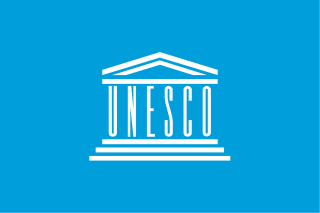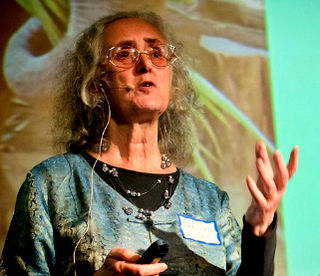Related Research Articles

The United Nations University (UNU) is the think tank and academic arm of the United Nations. Headquartered in Shibuya, Tokyo, Japan, with diplomatic status as a UN institution, its mission is to help resolve global issues related to human development and welfare through collaborative research and education.

The United Nations Environment Programme (UNEP) is responsible for coordinating responses to environmental issues within the United Nations system. It was established by Maurice Strong, its first director, after the United Nations Conference on the Human Environment in Stockholm in June 1972. Its mandate is to provide leadership, deliver science and develop solutions on a wide range of issues, including climate change, the management of marine and terrestrial ecosystems, and green economic development. The organization also develops international environmental agreements; publishes and promotes environmental science and helps national governments achieve environmental targets.
The Global 500 Roll of Honour was an award given from 1987 to 2003 by the United Nations Environment Programme (UNEP). The award recognized the environmental achievements of individuals and organizations around the world. A successor system of UNEP awards called Champions of the Earth started in 2005.
The International Social Science Council (ISSC) was an international non-governmental organization promoting the social sciences, including the economic and behavioural sciences. It was founded in Paris, France between 6 and 9 October 1952, under the auspices of UNESCO, following a Resolution at the 6th UNESCO General Conference in 1951. It was adopted on 19 September 1972, completed and revised on 14 November 1979, and underwent multiple revisions on 17 December 1985, 3 December 1992, 27 November 1998, 8 November 2006, and finally 10 December 2010. ISSC was registered in accordance with French Law.

The Decade of Education for Sustainable Development (DESD) 2005–2014 was an Education for Sustainable Development (ESD) initiative of the United Nations. The Decade was delivered by UNESCO as lead agency, and gave rise to Regional Centres of Expertise (RCE) networks, and the GUPES universities' partnership. The launch of the United Nations Decade of Education for Sustainable Development started a global movement to reorient education to address the challenges of sustainable development. It was the first UN Decade to establish a global monitoring and evaluation process and expert group. Building on the achievement of the Decade, stated in the Aichi-Nagoya Declaration on ESD, UNESCO endorsed the Global Action Programme on ESD (GAP) in the 37th session of its General Conference. Acknowledged by UN general assembly Resolution A/RES/69/211 and launched at the UNESCO World Conference on ESD in 2014, the GAP aims to scale-up actions and good practices. UNESCO has a major role, along with its partners, in bringing about key achievements to ensure the principles of ESD are promoted through formal, non-formal and informal education.

The United Nations Forum on Forests (UNFF) is a high-level intergovernmental policy forum. The forum includes all United Nations member states and permanent observers, the UNFF Secretariat, the Collaborative Partnership on Forests, Regional Organizations and Processes and Major Groups.
The UNESCO Confucius Prize for Literacy recognizes the activities of outstanding individuals, governments or governmental agencies and non-governmental organizations (NGOs) working in literacy serving rural adults and out-of-school youth, particularly women and girls. The Prize was established in 2005 through the support of the Government of the People's Republic of China in honour of the great Chinese scholar Confucius. It is part of the International Literacy Prizes, which UNESCO awards every year in recognition of excellence and inspiring experiences in the field of literacy throughout the world. The Confucius Prize offers two awards of US$20,000 each, a medal and a diploma, as well as a study visit to literacy project sites in China.

The United Nations Educational, Scientific and Cultural Organization (UNESCO) is a specialized agency of the United Nations (UN) aimed at promoting world peace and security through international cooperation in education, arts, sciences and culture. It has 193 member states and 12 associate members, as well as partners in the non-governmental, intergovernmental and private sector. Headquartered in Paris, France, UNESCO has 53 regional field offices and 199 national commissions that facilitate its global mandate.

The World Innovation Summit for Education (WISE) is an international initiative aimed at transforming education through innovation. WISE was established by Qatar Foundation in 2009 under the patronage of its chairperson, Sheikha Mozah bint Nasser. With a biennial Summit held in Doha, and a range of year-round initiatives, WISE's mission revolves around promoting new approaches to education and investigating new ways to address pressing global education challenges.
The Equator Prize, organized by the Equator Initiative within the United Nations Development Programme, is awarded biennially to recognize community efforts to reduce poverty through the conservation and sustainable use of biodiversity.
Global citizenship education (GCED) is a form of civic learning that involves students' active participation in projects that address global issues of a social, political, economic, or environmental nature. The two main elements of GCE are 'global consciousness'; the moral or ethical aspect of global issues, and 'global competencies', or skills meant to enable learners to participate in changing and developing the world. The promotion of GCE was a response by governments and NGOs to the emergence of supranational institution, regional economic blocs, and the development of information and communications technologies. These have all resulted in the emergence of a more globally oriented and collaborative approach to education. GCE addresses themes such as peace and human rights, intercultural understanding, citizenship education, respect for diversity and tolerance, and inclusiveness.
The Learning Teacher Network is a European non-profit, member-based education network and association, which performs as a European platform for professional debate in the vanguard of educational progress. The network works closely with UNESCO in Quality Education and the implementation of the Global Action Programme for Education for Sustainable Development (GAP/ESD).

Marilyn Mehlmann is a Swedish environmentalist and educator.
A climate-friendly school, or eco-school, encourages the education of sustainable developments, especially by reducing the amount of carbon dioxide produced in order to decrease the effects of climate change. The term "climate-friendly school" arose and was promoted by the United Nation's education for sustainable development program (ESD).

Action for Climate Empowerment (ACE) is a term adopted by the United Nations Framework Convention on Climate Change (UNFCCC). It refers to Article 6 of the Convention's original text (1992), focusing on six priority areas: education, training, public awareness, public participation, public access to information, and international cooperation on these issues. The implementation of all six areas has been identified as the pivotal factor for everyone to understand and participate in solving the complex challenges presented by climate change. The importance of ACE is reflected in other international frameworks such as the Sustainable Development Goals ; the Global Action Programme for Education for Sustainable Development ; the Aarhus Convention (2011); the Escazú Agreement (2018) and the Bali Guidelines (2010).

Climate change education (CCE) is education that aims to address and develop effective responses to climate change. It helps learners understand the causes and consequences of climate change, prepares them to live with the impacts of climate change and empowers learners to take appropriate actions to adopt more sustainable lifestyles. Climate change and climate change education are global challenges that can be anchored in the curriculum in order to provide local learning and widen up mindset shits on how climate change can be mitigated. In such as case CCE is more than climate change literacy but understanding ways of dealing with climate
The UNESCO Prize for Girls’ and Women’s Education is an award, recognizing outstanding contributions to the advancement of female education. Supported by the Government of the People’s Republic of China, the Prize is conferred annually to two laureates. The prize awards USD 50,000 to each laureate to further their work in the area of girls’ and women’s education. Laureates are nominated by Member States, in consultation with their National Commissions, as well as non-governmental organizations in official partnership with UNESCO. They are recognized by UNESCO's Director General.
Monitoring Education for Sustainable Development (ESD) refers to measuring progress in ESD learning compared to policy commitments, provision, institutional support, resources and others. Monitoring and evaluation (M&E) of Education for Sustainable Development is widely discussed in literature on ESD, including debates regarding methodology and strategies for interpreting the data.
The UNESCO King Hamad Bin Isa Al-Khalifa Prize for the Use of Information and Communication Technologies (ICT) in Education is a UNESCO prize which rewards projects and programmes of individuals, institutions, other entities or non-governmental organizations for the creative use of information and communication technologies to enhance learning, teaching and overall education performance.
References
- ↑ "Single View News - United Nations Educational, Scientific and Cultural Organization". www.unesco.org.
- ↑ "Decisions Adopted by the Executive Board at Its 207th Session" (PDF). UNESCO.
- ↑ "UNESCO-Japan Prize on Education for Sustainable Development" (PDF).
- ↑ "Selection Criteria". UNESCO. 24 March 2015.
- ↑ "Maastricht Green Office Model wins UNESCO-Japan Prize 2015". Maastricht University. 2015-11-06. Retrieved 29 February 2016.
- ↑ "UNESCO announces winners – SERES named!". SERES. 2015-09-25. Retrieved 29 February 2016.
- ↑ "Jayagiri Center awarded UNESCO-Japan prize on education for sustainable development". ANTARA News. 2015-11-07. Retrieved 29 February 2016.
- ↑ "UNESCO-Japan Prize on ESD". Archived from the original on 2016-09-30.
- ↑ "UNESCO-Japan Prize on ESD". Archived from the original on 2017-10-10.
- ↑ "UNESCO-Japan Prize on ESD". Archived from the original on 2018-09-24.
- ↑ "LAUREATES 2019". en.unesco.org. Archived from the original on 2020-10-31.